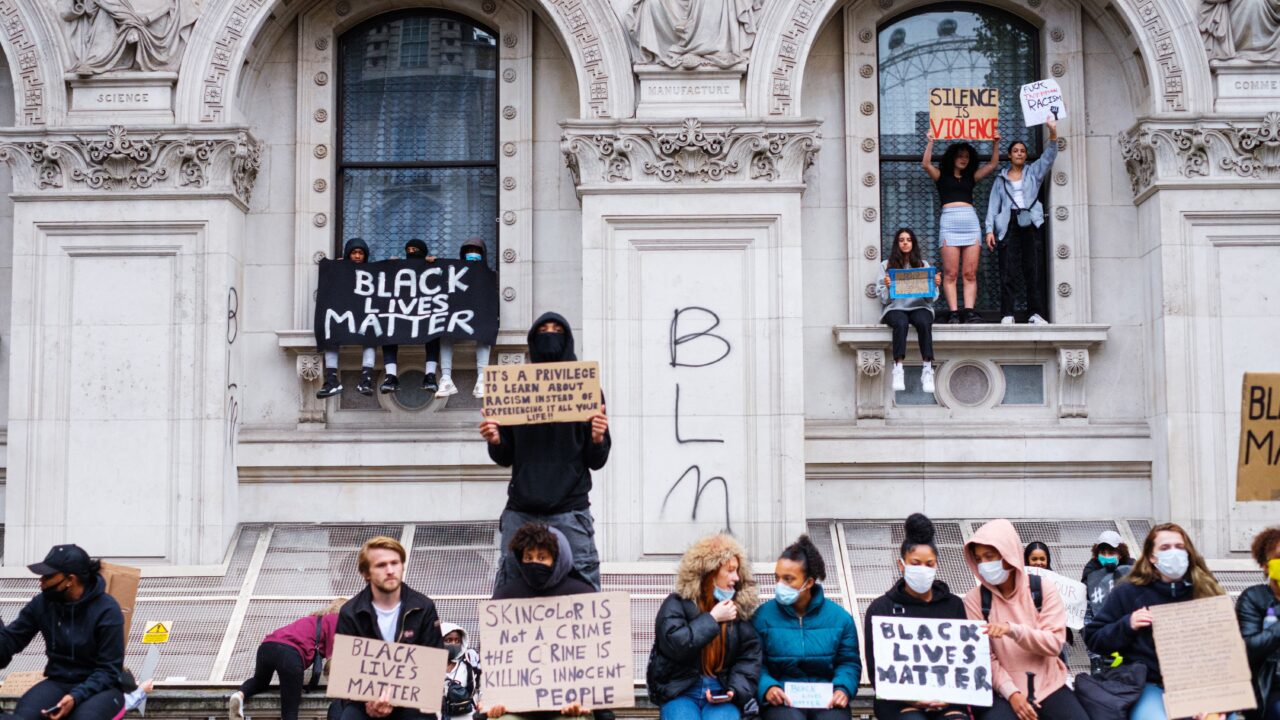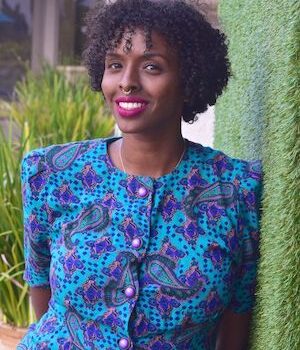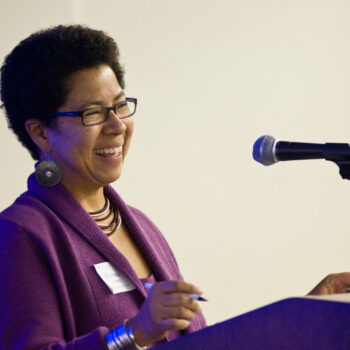Professor Barbara Ransby is an historian, writer, and organizer whose activism spans forty years and has included work with the Black Radical Congress, African American Women in Defense of Ourselves, the Movement for Black Lives, and the Rising Majority Scholars for Social Justice. Miski Noor, co-executive director of Black Visions Collective, spoke with Professor Ransby about the moment we’re in, the work we need to do to shift our culture, and her vision for the future. This interview has been edited and condensed.
What’s live for you today?
I am both hopeful and cautious about this moment and what it can provide in terms of opportunities for advancing a freedom agenda but also [about] the dangers that are lurking, as we saw on full display on January 6 with the white supremacist insurrection, if you will, [and] the ongoing scourge of police violence, which of course is not new [and has] gone on pretty much unabated. So I’m holding both of those, both the hopefulness and a little bit of caution, in my gut.
Tell us about the last year, and how this moment is unique as well as how it mirrors history.
History is the study of change over time. And so in a way, every historical moment is unique, but there are moments that are more like watersheds or pivots: more of a rupture than a continuity. In those periods, things have the potential to change in fundamental ways. I think we’re in a period like that now. It’s a “period” that has been ongoing; it’s never really just a moment, even though we use that term. But right now there’s the conjuncture of a number of crises, and all of it brought very much to the fore by the COVID pandemic.
There is a crisis of racial capitalism where the financialization of capital, the new forms of wealth creation and labor relations created by the infotech industry, and the climate crisis all create new contradictions and new challenges that puts us in a moment of different possibility. Then, of course, the train wreck that was the Trump administration was really an attempt to deploy white nationalism in order to save racial capitalism. And I don’t think the jury is out because Trump is out of office, but Trumpism continues to grow. The Turmpist proposition is that we need to look backward and that xenophobia and a celebration of the good old days of white supremacy are what will save this country — that narrative is still very much out there. It’s very dangerous. It has appeal to some white people, and we have to contest it mightily.
And then, of course, the other variable [that] makes this historical moment pivotal is the upsurge in anti-racist organizing, which I think the Movement for Black Lives and Black Lives Matter have been at the center of. We cannot say “we” organized all of those protests; we did not, and we always have to have humility as organizers. But the frame, the narrative, the exposure of the violence of the police, the creation of a language and a set of demands that people could rally around — all of that helped to set the stage for unprecedented numbers of people, including many non-Black people, [to come together] around opposition to anti-Black racism. Now people were out there for lots of different reasons, with lots of different theories of change and historical narratives in their heads, but they were out there protesting nonetheless, and they were standing on the right side of history, standing and marching against racism and state violence.
The challenge of a movement is to give those people a direction and a frame, a portal of entry, into our movement spaces. And I think that’s what a lot of people are thinking very deeply about how to do. So there’s a real moment of contestation about the future, and I feel more hopeful than cautious about the direction we’re going in, partly because of organizers like you, Miski, and many others who are fighting the good fight and trying to do so with heart and integrity and principle. And we need some guidelines. We need to ground ourselves in an analysis of what we’re up against and what’s possible, so that we’re not organizing in the dark. And I see that happening too. I see many spaces where people are asking very hard questions and pushing each other to clarify and to cohere, and that’s a good thing.
Why is it important to organize beyond ourselves or beyond our issues or what’s directly in front of us?
For a lot of reasons. Sometimes people joke and say, “We know what Barb is going to ask: Who is the ‘we’?” I ask that question a lot because all of our skin folk are not our kinfolk, as we say. We certainly know that to assume that all Black folk are in agreement is not correct, to say the least. And in some ways in this moment there are conflicting interests. I mean, there is a Black elite and a managerial class that have played a certain role — and the Movement for Black Lives, I think, has seen that very clearly. Black DAs, Black cops, Black mayors have often been on the wrong side, clearly, because of the positions and the power they hold and the systems that they oversee. So that’s one part of it. There’s not a simple answer to the question, “Who are we?” I would say the “we” is all of us genuinely interested in dismantling white supremacy, heteropatriarchy, and racial capitalism, and building a more just society.
But on the practical [side], to move a legislative agenda, to move a labor agenda, to move a cultural agenda, we have to work with many different communities and individuals, if you will, allies and potential comrades and co-conspirators — some of whom we may not always agree with. So just from a strategic point of view, but also from a principled point of view, having a Black-led multiracial organizing agenda is necessary. We live in a large world. People have choices to make, whoever they are in this world, and we have to struggle with people to oppose anti-Blackness, to oppose white supremacy, even if they’re white. And to take risks in doing that, to make sacrifices in doing that — that’s part of the struggle, and even though Black organizations are important, multiracial organizing is important too.
That said, a principled multiracial movement cannot pretend to be colorblind. That’s where the danger comes in. To have the class reductionist approach, [and] say we’re all suffering, we’re all in it together, ignores the different material conditions created by racism. When European settlers first arrived in what is now called the United States, the labor systems they created, the class structure they created were racialized systems. And so to ignore the different ways in which we experience economic hardship, the different degrees to which we experience violence and exclusion, is not to be honest about the political and economic landscape. So I think multiracial organizing is important and essential, but it also has to be done [with] a clear understanding of what fighting racism and white supremacy and racial capitalism means in the 21st century.
What is your vision for safety that would replace policing and imprisonment?
Well, I’m one that always stresses abolition has to be coupled with building, and I think that is absolutely crucial. So to say, how do we imagine safety is also to say, how do we imagine economic justice, and how do we imagine collective freedom? I don’t mean individual freedom for every individual to do whatever they want to do, but if a more just and equitable society is our goal, that by itself creates enormous safety and security. Much of the violence and danger that we confront on the street is a result of people not having what they need, people being excluded from the formal economy, people having been violated themselves in all kinds of ways by the system and other people. So if we nurture our children in a loving and nonviolent way, if we have communities that are living in abundance and equality, if we have culture and art all around us, can we imagine the kind of everyday violence that we see now?
And so that’s the long-term answer. That is not going to happen tomorrow, but it’s not a pie in the sky either. I think there are restorative justice, transformative justice, de-escalation, [and] prevention techniques that are working on certain kinds of problems that we have in our communities. But at the same time, I think really what we’re talking about is: social transformation is going to make us safe. That is what I truly believe. A social transformation toward a less violent, competitive, predatory, exploitative society, which also means — and this is where Black feminism comes in — eliminating and working against and dismantling the violent practices that stem from patriarchy, that stem from masculinist ways of handling conflict and differences. Doing harm to others to prove something that gets labeled as manhood leads to a lot of violence in our homes and streets. Combating those aspects of the dominant culture, which some of us have internalized, is also a part of the process of creating more safe, secure, and healthy communities for all of us. And I say that as lovingly for men as I do for women, girls, and fems. We have to reimagine what manhood and personhood means as a liberatory project.
What that’s bringing up for me is what Grace Lee Boggs and Jimmy Boggs say about the personal transformation work required for our collective transformational work and what it means for us to take responsibility for our conditions and for each other. That’s what revolution is versus rebellion.
It’s interesting that so many people are reading Grace and Jimmy Boggs now. I grew up in Detroit, so they were very much a part of the political scene and community that I was a part of as a teenager. I knew both of them, but Grace was very beloved to me because she lived longer, and I had contact with her over the years until she died. And I also had disagreements with Grace. So I think they were right about certain things, and I appreciate those things and the notion of grounding oneself in a community, interrogating ourselves and the ways in which we have internalized the values of the dominant society. That also comes from the Italian Marxist Antionio Gramsci and a lot of other places too.
The point is that cops on every corner is not the only force that holds an unjust society together. [It’s also] what we call culture, and I don’t just mean songs and dance and art; I mean the things that we accept as truths: the notion that competition is better than cooperation, that some people are smarter than others, this meritocracy myth that exists. So there [are] all kinds of ways that we internalize the dominant culture that compromises our ability to resist, and inhibits us being who we need to be in order to create and sustain a different kind of world. The seduction of consumption, and just a whole number of things. Even in our intimate relationships, what is desire linked to conquest and domination? So I think there’s a lot of work to do on “us” and the world. I certainly am not an advocate of cloistering ourselves away and fixing ourselves before we go out and confront a system that’s destroying and killing our people. We have to do both simultaneously.
It feels like there are a lot of lessons that are being repeated, or a lot of wisdom that folks really need to hone in on. So, the last question I want to ask you is, what is being said but remains unheard?
Perhaps it is an extension of what we were just talking about. I think the coupling of self-transformation and structural change is really at the core of our task. A lot of the struggles around transparency and accountability in our movements is also about us rejecting some of the cultural truths that we have inadvertently or unknowingly internalized in terms of power — who claims it, how you leverage it, and all of that. Really, to embrace the messiness of radical democracy and collective power sharing is the ultimate test of whether we will win. So I don’t have any final pearls of wisdom, but I think the conversation that we’ve been having today is something that we need to continue to have in as many forums as possible.


